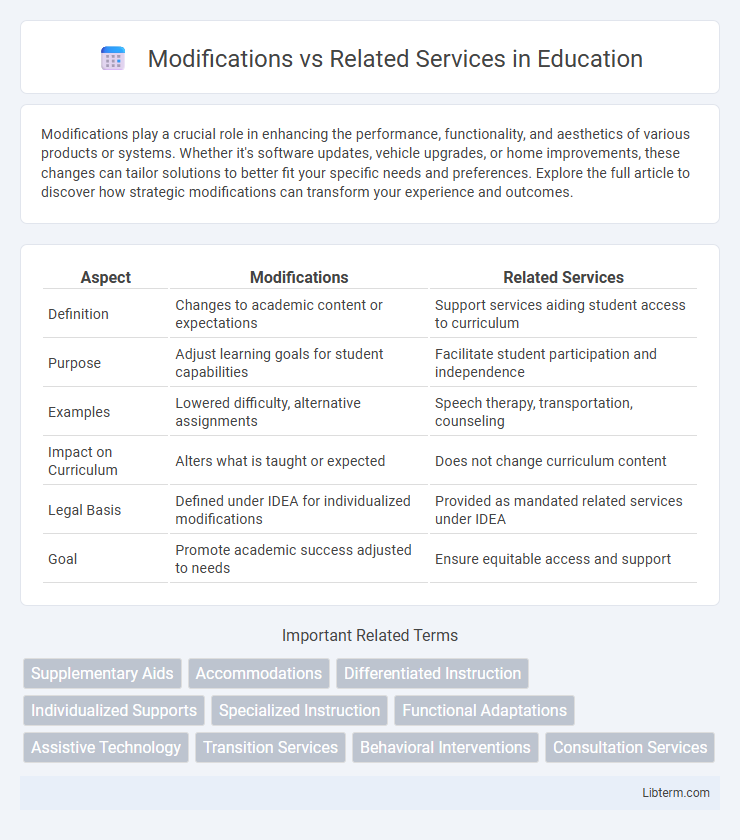Modifications play a crucial role in enhancing the performance, functionality, and aesthetics of various products or systems. Whether it's software updates, vehicle upgrades, or home improvements, these changes can tailor solutions to better fit your specific needs and preferences. Explore the full article to discover how strategic modifications can transform your experience and outcomes.
Table of Comparison
| Aspect | Modifications | Related Services |
|---|---|---|
| Definition | Changes to academic content or expectations | Support services aiding student access to curriculum |
| Purpose | Adjust learning goals for student capabilities | Facilitate student participation and independence |
| Examples | Lowered difficulty, alternative assignments | Speech therapy, transportation, counseling |
| Impact on Curriculum | Alters what is taught or expected | Does not change curriculum content |
| Legal Basis | Defined under IDEA for individualized modifications | Provided as mandated related services under IDEA |
| Goal | Promote academic success adjusted to needs | Ensure equitable access and support |
Understanding Modifications and Related Services
Understanding modifications and related services is crucial for effective contract management and procurement processes. Modifications refer to changes or adjustments made to an existing contract's scope, terms, or conditions, often requiring formal approval to ensure compliance and accountability. Related services encompass supplementary or supportive tasks linked to the primary service or product, enhancing functionality and providing continuity without altering the original contract framework.
Key Differences Between Modifications and Related Services
Modifications refer to changes made to existing contracts or projects, often altering scope, specifications, or terms to adapt to new requirements or conditions. Related services involve supplementary activities that support the primary contract, such as maintenance, consulting, or training, which do not alter the original agreement's core deliverables. Key differences lie in modifications directly impacting contract terms and obligations, while related services enhance or complement the contract without changing its fundamental scope.
Legal Definitions and Educational Implications
Modifications refer to changes in curriculum content, instruction level, or performance expectations tailored to meet individual student needs, legally defined under the Individuals with Disabilities Education Act (IDEA) as alterations that significantly change the learning goals. Related services include specialized support such as speech therapy, occupational therapy, and counseling, necessary to help students access education but do not modify academic content. Educational implications involve ensuring legal compliance with IDEA mandates, securing appropriate Individualized Education Program (IEP) plans, and providing equitable access to learning through targeted modifications and essential related services.
Examples of Common Modifications in Schools
Common modifications in schools include extended time on tests, simplified instructions, and preferential seating for students with learning disabilities. These adjustments aim to tailor the learning environment to individual needs without altering the standard curriculum. Related services, such as speech therapy or counseling, complement modifications by providing specialized support that enables student participation.
Types of Related Services in Special Education
Related services in special education include transportation, speech-language pathology, occupational therapy, physical therapy, and counseling to support students' access to the general curriculum. These services complement modifications, which involve changes to what a student is expected to learn or demonstrate, focusing instead on assistance that helps students benefit from their educational program. Ensuring appropriate related services is critical for meeting each student's individualized education program (IEP) goals and fostering their academic and social development.
Determining Student Eligibility for Modifications vs Related Services
Determining student eligibility for modifications versus related services involves assessing whether a student requires changes to the general curriculum or support services to access learning. Modifications alter the content, performance expectations, or assessment criteria, providing individualized accommodations, whereas related services offer supplementary support like speech therapy or counseling without changing academic standards. Accurate eligibility determination relies on multidisciplinary evaluations and collaboration among educators, specialists, and families to ensure proper placement and support tailored to the student's unique needs.
Role of the IEP Team in Decision-Making
The IEP team plays a critical role in determining whether a student requires modifications or related services, analyzing individual needs based on comprehensive evaluations and progress data. Their collaborative decisions ensure tailored educational approaches that address both curriculum adjustments and necessary supports like speech therapy or occupational services. By focusing on functional outcomes and academic accessibility, the team aligns interventions to promote optimal student growth within the least restrictive environment.
Impact on Student Learning and Outcomes
Modifications alter the curriculum to accommodate a student's unique learning needs, directly influencing academic achievement by providing access at an appropriately challenging level. Related services, such as speech therapy or counseling, support the student's ability to benefit from instruction without changing the core curriculum content. Both strategies collaboratively enhance student learning outcomes by addressing diverse needs through tailored instruction and necessary support mechanisms.
Parental Rights and Advocacy Tips
Modifications in educational settings involve tailored changes to curriculum or assessment methods to meet a student's unique needs, whereas related services provide supportive assistance such as speech therapy or counseling essential for a child's access to education. Understanding both concepts empowers parents to advocate effectively by requesting appropriate evaluations and services aligned with their child's Individualized Education Program (IEP). Key advocacy tips include thorough documentation of the child's needs, clear communication with educators, and knowing legal rights outlined under the Individuals with Disabilities Education Act (IDEA).
Best Practices for Implementation and Collaboration
Effective implementation of modifications and related services requires clear communication, thorough documentation, and defined roles among all stakeholders. Establishing collaborative platforms, such as shared project management tools and regular interdisciplinary meetings, enhances coordination and ensures alignment on service delivery and change management goals. Employing evidence-based frameworks and continuous feedback loops promotes adaptive improvement and maximizes positive outcomes in educational or therapeutic settings.
Modifications Infographic

 libterm.com
libterm.com